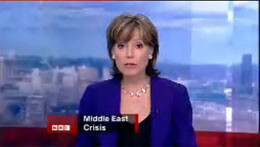Arab Media Watch 18 July 2006

British media coverage of Lebanon/Israel conflict: A crisis of objectivity?
Of the broadcasters, the BBC has four correspondents in Israel but none in Lebanon (though Jeremy Bowen is roaming), ITN and Sky News have more correspondents in Israel than Lebanon, and Channel 4 and Channel 5 have equal numbers in both countries.
Concerning newspapers, the Guardian, Independent and Times have more people in Israel than Lebanon, and those papers, along with the Daily Mail, have published more articles from Israel and given more column inches to those articles (almost three times as many in the Mail).
The Mail and Daily Telegraph have an equal number of people in both countries. There was a discrepancy with the Financial Times, which said it had up to four people in Israel and one in Lebanon, though AMW monitoring found an equal number in both countries. The Telegraph and FT have published the same number of articles from both countries.
The Daily Express is the only paper that has so far been filing solely from Israel. A spokesman gave various reasons for the lack of a presence in Lebanon, ranging from “no reason in particular,” to “we don’t know anyone there,” to cost and safety issues, and finally, to “lifestyle issues.” However, when AMW suggested it would be more balanced to be present in both countries, he responded: “You’re absolutely right.”
The Daily Star, Evening Standard and Metro have no one in either country. A Sun correspondent landed only today in Beirut, almost a week into the crisis, and when AMW called the newspaper, someone at the foreign desk hung up after we asked how many correspondents they had in both countries. On a second attempt, AMW was refused that information, the Sun being the only newspaper not to be forthcoming, though the Mail did initially tell us to “read the paper.”
AMW is not passing judgment on the quality of reporting from either country, but is concerned that journalists based predominantly in one country may end up empathising more with the people there, and so will the public if they see one side of the conflict more than the other.
For instance, the Daily Mail’s Richard Pendlebury reported on 15 July: “Visiting the towns in northern Israel I could understand the sense of vulnerability they feel.” He added that “all I can report is what I have seen on the Israeli side of this seemingly intractable, ongoing conflict …”
The Guardian’s Middle East editor Brian Whitaker wrote on 17 July: “Viewed from Lebanon, the TV coverage of destruction in Israel, in terms of the amount and the tone, seems wildly out of proportion compared with what is happening across the border.”
AMW urges the media to redress the balance, particularly since the vast majority of casualties and damage is taking place in Lebanon. The public have a right to read, see and hear the Lebanese perspective at least as much as that of Israel.
Related Links
Arab Media Watch is an independent, non-profit organisation set up in 2000 to strive for objective coverage of Arab issues in the British media.